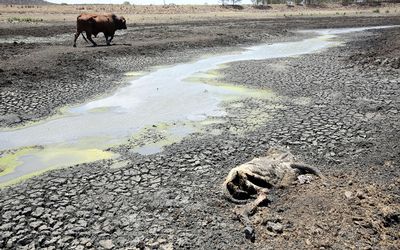THE drought-ravaged agriculture sector would need R12bn in government support over three years if it were to return to pre-drought levels of food security, AgriSA said on Monday. The support should be in the form of guarantees to enable farmers to secure loans to plant crops when the rain returns.
AgriSA president Johannes Möller and his delegation on Monday told the Cape Town Press Club of farmers losing their land, farm workers losing their jobs, and many of them going hungry.
State support would be used to save commercial farmers, emerging commercial farmers, and small-scale farmers from financial ruin as a result of failed crops and having to thin out herds.
AgriSA executive director Omri van Zyl said that while a medium-term scenario would require R12.5bn in support over three years, this could rocket to R16bn in three years in a worst-case scenario, or fall to about R7bn in a best-case scenario, "and this is just to get us back to where we were before the drought".
Chairman of the agriculture business chamber AgriBiz Schalk Pienaar said the sector needed government guarantees, so that farmers could roll over the repayment of their loans. Farmers were also asking for a subsidy of R1,000 per farm worker per month, without which many farmers would be forced to retrench workers. The drought had the potential to wipe out small-scale farmers, he said.
Mr van Zyl said if farm workers were retrenched, this would lead to accelerated urbanisation and poverty, and an increase in crime. AgriSA was also advocating for a consolidation of fiscal priorities and the government could help with preferential interest rates, tax relief and the lifting of import restrictions to ensure food security. There had to be assistance for farmers to maintain food security.
Mr van Zyl said other countries in the region were also in crisis. Zimbabwe had declared the drought a national disaster and, with an estimated 2.5-million people going hungry, SA could expect an increase in illegal migration.
Mr Möller said SA needed 11.25-million tonnes of grain a year and this year the harvest would deliver 6-million to 7-million tonnes, leaving a shortfall to be filled with imports. It was impossible to plan for this level of drought.
"If it rains, you plant. It is going to be very difficult for farmers to survive without government support. It is not just farmers that will suffer, but the entire rural community, including emerging farmers and farm workers," he said.
In a separate development, National Assembly speaker Baleka Mbete has allowed for a parliamentary debate on the drought, scheduled for Thursday.
Democratic Alliance agriculture spokeswoman Annette Steyn welcomed the move, describing it as recognition of the severity of the drought and its effect on agriculture, jobs, and food prices, along with its debilitating effect on food security and the economy.
"It is Parliament’s responsibility to hold the executive to account in this regard, and it is high time that government diligently apply itself in declaring this drought, the worst year on record since 1904, a national disaster," Ms Steyn said. "To date, government has not taken this drought as seriously as it ought to."

Drought. Picture: SUNDAY TIMES
THE drought-ravaged agriculture sector would need R12bn in government support over three years if it were to return to pre-drought levels of food security, AgriSA said on Monday. The support should be in the form of guarantees to enable farmers to secure loans to plant crops when the rain returns.
AgriSA president Johannes Möller and his delegation on Monday told the Cape Town Press Club of farmers losing their land, farm workers losing their jobs, and many of them going hungry.
State support would be used to save commercial farmers, emerging commercial farmers, and small-scale farmers from financial ruin as a result of failed crops and having to thin out herds.
AgriSA executive director Omri van Zyl said that while a medium-term scenario would require R12.5bn in support over three years, this could rocket to R16bn in three years in a worst-case scenario, or fall to about R7bn in a best-case scenario, "and this is just to get us back to where we were before the drought".
Chairman of the agriculture business chamber AgriBiz Schalk Pienaar said the sector needed government guarantees, so that farmers could roll over the repayment of their loans. Farmers were also asking for a subsidy of R1,000 per farm worker per month, without which many farmers would be forced to retrench workers. The drought had the potential to wipe out small-scale farmers, he said.
Mr van Zyl said if farm workers were retrenched, this would lead to accelerated urbanisation and poverty, and an increase in crime. AgriSA was also advocating for a consolidation of fiscal priorities and the government could help with preferential interest rates, tax relief and the lifting of import restrictions to ensure food security. There had to be assistance for farmers to maintain food security.
Mr van Zyl said other countries in the region were also in crisis. Zimbabwe had declared the drought a national disaster and, with an estimated 2.5-million people going hungry, SA could expect an increase in illegal migration.
Mr Möller said SA needed 11.25-million tonnes of grain a year and this year the harvest would deliver 6-million to 7-million tonnes, leaving a shortfall to be filled with imports. It was impossible to plan for this level of drought.
"If it rains, you plant. It is going to be very difficult for farmers to survive without government support. It is not just farmers that will suffer, but the entire rural community, including emerging farmers and farm workers," he said.
In a separate development, National Assembly speaker Baleka Mbete has allowed for a parliamentary debate on the drought, scheduled for Thursday.
Democratic Alliance agriculture spokeswoman Annette Steyn welcomed the move, describing it as recognition of the severity of the drought and its effect on agriculture, jobs, and food prices, along with its debilitating effect on food security and the economy.
"It is Parliament’s responsibility to hold the executive to account in this regard, and it is high time that government diligently apply itself in declaring this drought, the worst year on record since 1904, a national disaster," Ms Steyn said. "To date, government has not taken this drought as seriously as it ought to."





















Change: -1.32%
Change: -1.58%
Change: -0.33%
Change: -1.17%
Change: -3.76%
Data supplied by Profile Data
Change: -0.46%
Change: -1.14%
Change: -1.32%
Change: 0.00%
Change: -1.25%
Data supplied by Profile Data
Change: -0.03%
Change: -0.36%
Change: -0.19%
Change: 0.00%
Change: -0.22%
Data supplied by Profile Data
Change: -0.20%
Change: -0.74%
Change: -0.65%
Change: -0.80%
Change: -0.63%
Data supplied by Profile Data